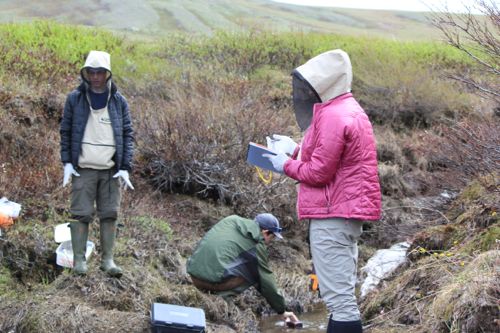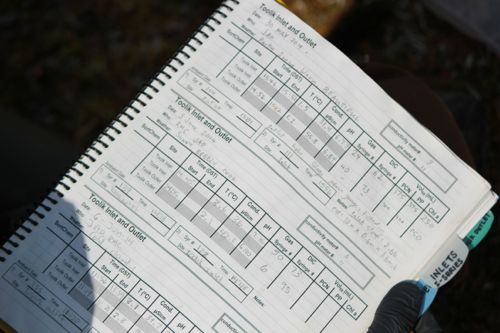Science Investigation in the Field
As a science teacher, I've always required by students to complete an independent science research project. Students did not need to enter a science fair, and I am proud of students who challenge themselves by entering a science fair competition, regardless of the outcome.
With this assignment in mind, its been interesting for me to watch the processes scientists at Toolik go through as they are designing and carrying out their own science investigations.
Ask the Right Question and Hypothesis
For students, the hardest part of their science project often is coming up with an interesting, testable question. Scientists, I found out, can have this same challenge.
Describing research being done at Toolik, Professor George Kling, University of Michigan, states that a good experimental question "Is interesting regardless of the outcome". That is, whether or not a hypothesis is supported, is the information received from the experiment useful? Is the knowledge new, or simply supporting an assumed idea? Crafting an experimental question and hypothesis that fits this criteria is a challenge.
Once scientists have a question, they next consider what needs to be done to answer the question. Is the necessary technology available, and are they sufficiently trained to use the technology? Are the tests repeatable? Also, are there grant funds to support this work? Most of the researchers' work is supported by funding sources such as the National Science Foundation. If supporting funds aren't available, work cannot get done.
Scientists are interested in the hypothesis of a test. Very often I heard the question "What is your hypothesis?"
 Collecting data in the field
Collecting data in the field
Carefully Collect Data
The scientists, graduate students, and lab assistants take great care to follow protocol. Data is analyzed for discrepancies in collection methods. If all people are collecting the same information in the same way, results should be similar.
Keep Excellent Notes
Lab notebooks are meticulously kept. Whenever there was a question about data, a test location, or a protocol, notebooks were referred to. I know that my students are disappointed when points are taken off from their lab notebook, but keeping a neat, detailed lab notebook is key to a successful project.
 Lab notebook
Lab notebook
Data Analysis is Fun!
Once all of the tests are completed, the final challenge is to uncover what the numbers show. Was the hypothesis supported or not? What other questions can be asked? What do all of the numbers mean? Interpreting test data is the final but most important step of the experiment. Graphic analysis was used to demonstrate what the data is showing.
Collaboration is Key
Even though science teams are from various agencies, have different areas of interest, and are, essentially, competing for limited grant funding, the groups collaborate well together. Teams work together to collect data and share expertise. Scientists plan future projects to collaborate on. Students often tell me that they don't like to work in groups, especially if they aren't friends with others in the group. Businesses tell me that they want students who work well with others. You don't have to be friends with everyone, but be able to work together to get a job done.
Advice to students: Keep a good lab notebook, starting with school notebooks. Learn excellent graphing skills, and be able to use various computer programs so that numbers can be visualized. Better yet, be able to write a computer program that organizes and displays data. Practice working as part of a team. These skills will help your future careers.


Comments